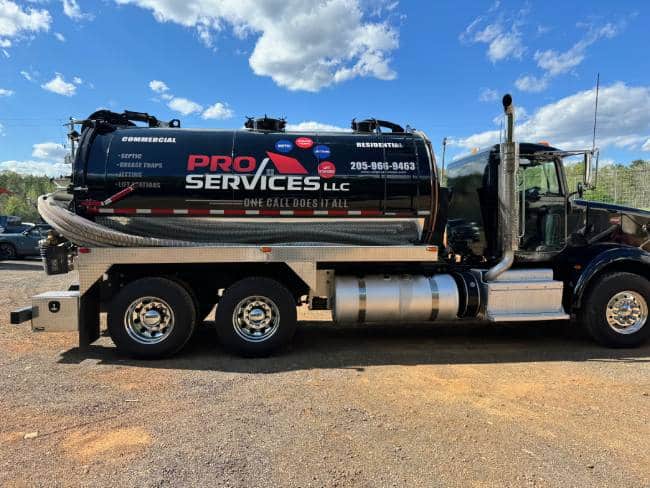
Get The Right Septic Tank For Your Family With This Guide
When it comes to installing a septic system, one of the most critical decisions you’ll make is choosing the right septic tank size and type. The septic tank you select directly impacts the efficiency, longevity, and overall health of your system, which is why it’s essential to get it right from the start.
At Pro Services Plumbing & Air, we guide homeowners through every step of the septic tank selection process to help you get a system that fits your needs and property. In this blog, we’ll break down everything you need to know about choosing the correct septic tank size and type, and why it matters for your home.
Why Is Septic Tank Size Important?
The size of your septic tank is determined primarily by the number of people in your household and the amount of water your family uses daily. A tank that’s too small can lead to frequent pump-outs, backups, and even system failures, while an oversized tank may not function efficiently. Getting the size just right will ensure that your system works smoothly without the risk of costly repairs or constant maintenance.
Septic Tank Size Recommendations
Here’s a general guide to help you understand how septic tank sizes correspond to household size and water usage:
- 1-2 Bedrooms: A 750-gallon septic tank is usually sufficient for small homes with 1-2 bedrooms and low to moderate water usage.
- 3 Bedrooms: Most 3-bedroom homes will require a 1,000-gallon septic tank to manage typical water consumption.
- 4-5 Bedrooms: Larger households with 4-5 bedrooms typically need a 1,250 to 1,500-gallon tank to handle higher water usage.
- More than 5 Bedrooms: For larger homes with more than 5 bedrooms or homes with significant water usage (multiple bathrooms, large appliances), a 1,500-gallon tank or more is often recommended.
In addition to bedroom count, your daily water usage also plays a critical role in tank sizing. If your household tends to use more water than average—due to long showers, irrigation systems, or multiple water-using appliances—you may need a larger tank to accommodate the higher flow of wastewater.
Understanding Septic Tank Types: Which One is Right for You?
In addition to size, the type of septic tank you choose is equally important. Different materials offer distinct advantages, so pick the one that best suits your property’s conditions, budget, and local regulations.
Concrete Septic Tanks
Concrete septic tanks are one of the most durable options available. These tanks can last for decades and are highly resistant to corrosion. However, they are heavier and more expensive to install due to their weight. Concrete tanks are ideal for properties that require a robust, long-lasting solution, particularly in areas where durability is essential due to soil conditions or local regulations.
Pros:
- Extremely durable and long-lasting
- Resistant to corrosion and external damage
- Suitable for larger properties or high-water usage homes
Cons:
- Heavier and more expensive to install
- May require professional handling due to the tank’s weight
Fiberglass Septic Tanks
Fiberglass tanks are lightweight and easy to install, making them a popular choice for many homeowners. They are resistant to cracking, rust, and corrosion, which makes them highly durable. Fiberglass tanks are especially ideal for properties with poor soil conditions, as they are less likely to shift or move over time.
Pros:
- Lightweight and easy to install
- Highly resistant to corrosion and cracking
- Suitable for properties with poor soil conditions
Cons:
- Can be more expensive than plastic tanks
- May still require professional installation due to size
Plastic (Polyethylene) Septic Tanks
Plastic tanks are another cost-effective, lightweight option for septic systems. These tanks are resistant to rust and corrosion, and they are easier to install compared to heavier materials like concrete. However, plastic tanks may be prone to shifting in areas with unstable soil or high water tables, so it’s essential to consult with a professional before installation.
Pros:
- Lightweight and affordable
- Resistant to rust and corrosion
- Ideal for smaller properties or homes with low to moderate water usage
Cons:
- Can shift in unstable soil conditions
- Not as durable as concrete or fiberglass options
Factors to Consider When Choosing a Septic Tank
When choosing the size and type of your septic tank, there are several additional factors to consider for optimal performance:
- Soil Composition: The type of soil on your property affects how well wastewater is absorbed into the drain field. Homes with poor drainage may require specialized systems or larger tanks to handle the flow.
- Water Table Levels: If your property has a high water table, it’s essential to choose a tank that won’t be prone to shifting or flooding. Elevated or above-ground systems may be necessary in these cases.
- Local Regulations: Every area has its own set of rules and regulations governing septic systems. Your septic tank must meet local health codes, and our team ensures that your system is compliant with all regulations.
- Environmental Impact: For environmentally-conscious homeowners, there are eco-friendly septic systems available that use less water and promote faster decomposition of waste. We can help you choose a system that minimizes environmental impact.
Professional Installation for All Septic Tank Sizes and Types
Choosing the right septic tank size and type is the first step toward a healthy and efficient septic system. But even the best tank won’t work properly if it’s not installed correctly. That’s why professional installation is essential. At Pro Services Plumbing & Air, our licensed and certified technicians ensure your septic tank is installed with precision, from site evaluation and soil testing to final inspections.
We take the guesswork out of septic tank installation, so you can rest easy knowing that your system will function properly for years to come.
Don’t Take Chances With Your Septic System
Selecting the correct septic tank size and type for your home is crucial to maintaining a reliable, long-lasting system. If you’re unsure which tank is right for you, the experts at Pro Services Plumbing & Air are here to help. We offer personalized assessments so you get a system that meets your needs and complies with all local regulations.
Contact us today to discuss your septic tank options and schedule a consultation!

